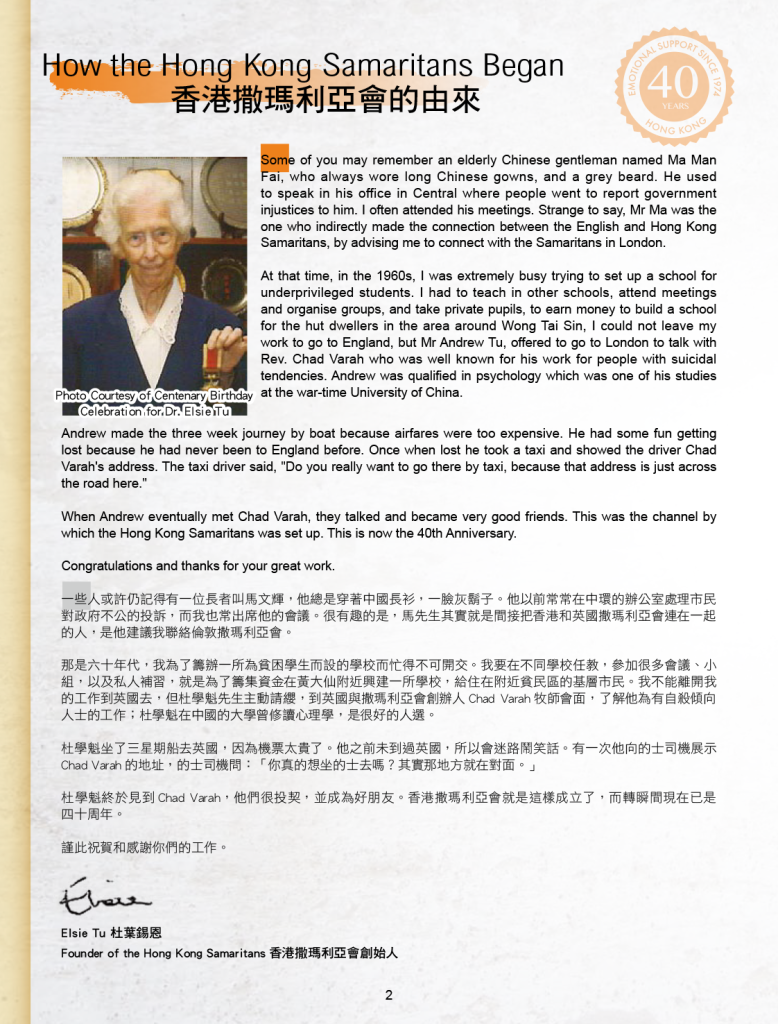ORIGINS
HONG KONG
In 1958, a suicide prevention service in Hong Kong was started by the late Andrew Tu (died 2001), who was a friend of Chad Varah. Working at Mu Kuang School at that time was a teacher, Dave Tredrea, who had been a Samaritan in the UK. He was pivotal in gathering a group of like-minded people together to form an English speaking service. This became The Samaritans in 1960. Chad Varah officially recognised Hong Kong as the first overseas branch of the Samaritans. A Chinese speaking branch worked from Lok Fu which eventually became a separate organisation known as Samaritan Befrienders.
The Samaritans continued as a multilingual service and in April 1976 were able to move into an office in the old Sailors and Soldiers Home in Wanchai with Vanda Scott as Director. There, with an increasing number of volunteers, they provided a 24 hours a day, 365 days a year hotline, plus “flying squads” when needed. In 1982, The Samaritans (English Speaking Service) became a registered branch of what was then known as Befrienders International (now Befrienders Worldwide) – the umbrella organisation of centres which follow the seven principles and practices of the Samaritans. Five years later an office in Wan Chai MTR station was made available, which eased a difficult situation when the Sailors and Soldiers Home was redeveloped.
In 1993, The Samaritans moved to a new centre in Chai Wan, provided by the Government Property Agency. Dr Chad Varah visited Hong Kong for a fundraising concert in 1994. He also conducted a workshop at the Centre. Dr Chad Varah described Samaritans as “Ordinary people doing extraordinary things.” We were renamed the Samaritans, 24-hour multilingual suicide prevention hotline.
Acutely aware of the needs of the predominantly Cantonese speaking population, The Samaritans worked with Befrienders International to establish another suicide prevention hotline service in early 1995, 生命熱線SPS, (Suicide Prevention Services), a Cantonese speaking service in Ping Shek, Kowloon, while The Samaritans in Chai Wan continues to provide a multi-lingual service. The name “English Speaking Service” was dropped in early 1997.
Together with 348 independent emotional support centres in 32 countries, The Samaritans Hong Kong make an impact on suicide prevention. These centres provide an open space for those in distress to talk and be heard by providing services via telephone helplines, emails, text messaging, face to face contacts, outreach, and partnerships.
Befrienders Worldwide Charter
Key common principles of Member Centres
- Centres provide emotional support to people who are suicidal, or in general distress
- Confidentiality is respected
- Centres are non-political and non-sectarian, and volunteers do not seek to impose their own convictions on anyone
- Where appropriate, callers may be invited to consider seeking professional help in addition to the emotional support offered by the Centre
- Centres are mainly resourced by volunteers
- Volunteers are selected, trained, mentored and supported by other experienced volunteers and any necessary relevant professional experts
- Centres are mutually supportive and committed to sharing information with other member Centres, and participating in processes and activities of the network


